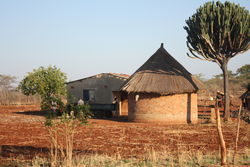“I am learning something: a new way for planting maize,” announces Francis Mussa, with a slight smile on his face. “Twenty centimetres apart from maize stem to maize stem,” he explains as he loosely grips a healthy stalk in his right hand. Standing tall behind him are several rows of maize that line half of the perimeter of the new OM Malawi ministry base.
Francis is a missionary from Malawi working with OM, primarily with children’s ministry. He lives in the small village of Mussa—named after his grandfather—approximately four kilometres from the base. Francis, as well as several other Malawian missionaries, learnt new techniques for planting maize, trees and vegetables from South African missionary Div Du Plessis. Div and his wife, Eleanor, joined OM Malawi to head up the construction of the base.
According to Div, Malawi is a farming community. “It’s a small country with a lot of people,” he said, “and they all farm. So if we really need to reach these people [with the Gospel], it’s through farming. I mean, that’s their heart; that’s their livelihood. They can’t live without food. So for me, that’s a big entry strategy. Just teach them Farming Foundations.”
Farming Foundations is a course that teaches sustainable farming practices as well as biblical principles, such as hard work, stewardship and proper planning. The base currently has a small garden with beetroot, lettuce, cucumber, green beans, green pepper, onion and many other crops. Many trees and plants are also being cultivated, such as banana, avocado, guava, mango, granadilla, pawpaw and sugar cane.
Francis has also started to implement his newfound knowledge in his village. Other villagers have been quick to notice Francis’s activities and they too want to learn the new ways of farming. “They come to ask me, and I teach them,” says Francis. “To have good trees and fruits you can do it this way. And when there is mistake, they call me to see and teach a good way.”
With or without money, or even food, Francis has a strong desire to preach the Gospel to people who haven’t heard it before.
The success of crops is crucial to missionaries like Francis, who currently have no other means of financial support. The 21-year-old lives in a tiny two-room house with no water or electricity. He is co-dependent with his family members. Francis admits that he has trouble affording cosmetics, soap and clothes. However, he asserts that he doesn’t use his financial problems as an excuse to stop his ministry. With or without money, or even food, Francis has a strong desire to preach the Gospel to people who haven’t heard it before. “It’s my desire to go and preach the word of God where Jesus tells me to go,” he said.
Besides the plants previously mentioned, Francis is growing cotton, something he became inspired to do through a radio programme. To buy the cottonseeds he first harvested two bags of rice from one of his fields, then waited until December when the price of rice was at its peak before selling. The plants are nearly ready for harvest, and Francis is optimistic about the impact their sale will have on his family.
“They (the cotton plants) can survive me for the different problems that I face,” he said. “I can help also my parents to have food. Enough food for this year!”
BY Brad Livengood




